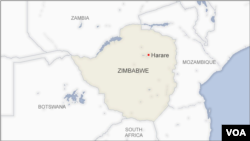Amnesty International is criticizing Zimbabwe's plan to evict 12,000 members of the Shangani indigenous minority from ancestral land. Zimbabwe's government this week indicated the evictions, which will make way for animal feed production, will go ahead despite a court order to halt the move.
Robert Shivambu, Amnesty International's spokesman for Southern Africa, said Zimbabwe should stop the planned evictions of the Shangani people, who live in Chiredzi district’s Chilonga village on the border with Mozambique. The villagers are being kicked out to make way for grass production to make animal feed for a dairy company.
"Zimbabwe authorities are attempting to remove Chilonga people from their homes to make way for commercial interests without offering them any alternative accommodation," he said. "The affected people are anxious and have nowhere to go. Forced evictions drive people into poverty and destroy livelihoods. Zimbabwe authorities have [a] grim history of not observing due processes when evicting people, including failing to consulting affected communities or offering alternative place of accommodation when carrying out evictions."
Livison Chikutu, 44, is unemployed and one of 12,000 Shanganis set to be evicted, along with his wife and four children.
Speaking from Chiredzi via a messaging application, he said an eviction would leave them homeless.
"The government is against the people," he said. "They are doing so because we are a minority tribe. This area of ours is very rich, especially in terms of the soil – black soil. So, the government just wants to shift us. In other words, they are saying go back to Mozambique, where historically we are said to be coming from."
Chikutu and Amnesty International say authorities are harassing the indigenous minorities despite a March 6 court order that suspended the planned eviction.
Ezra Chadzamira, President Emmerson Mnangagwa's representative in the area Chiredzi falls, refused to comment on the allegations but defended the planned evictions this week to journalists.
He said production of alfalfa in Chiredzi is a welcome development, as people there raise cattle and goats. They will get feed for their animals, said Chadzamira, and they will also become employed. He laso said some Shangani people will become alfalfa growers.
Chadzamira insisted the government is not evicting people, just realigning settlements so there is land for alfalfa production and animal grazing. He said it's a development initiative that will lift people up.
Not everyone agrees with the government’s positive spin on the project.
The issue dominated debate in Zimbabwe’s parliament this week.
Independent lawmaker Temba Mliswa opposes to evicting the Shangani people.
"They have been there for a long time, many years," he said. "They are 12,000 of them, plus those who live off them. It will be 50,000 and over one person? Have we now got to a point of reversing the land reform? What is the cost of 12,000 people, vis-à-vis one farmer? The government has enough farms to be able to give. Identify and give it to him. We cannot afford to reverse the land reform. The gains of the struggle. What are the people of Zimbabwe going to be left with?"
Zimbabwe's government said it would address the concerns about the evictions in due course, but didn't give a specific time frame.




